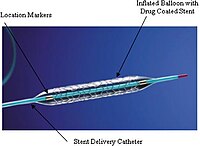
Photo from wikipedia
AIM To compare the patency and safety of covered metallic stents (CMS) and the double-J stent (DJS) for treating malignant ureteral obstruction (MUO) in advanced gastric cancer (AGC). MATERIALS AND… Click to show full abstract
AIM To compare the patency and safety of covered metallic stents (CMS) and the double-J stent (DJS) for treating malignant ureteral obstruction (MUO) in advanced gastric cancer (AGC). MATERIALS AND METHODS Between 2016 and 2018, the medical records of 61 patients (84 ureters; CMS, 39 patients, 54 ureters; DJS, 22 patients, 30 ureters) with MUO caused by AGC were reviewed retrospectively. The Kaplan-Meier method and log-rank test were used to evaluate differences of primary or assisted primary patency between groups. Cox regression was conducted separately for early (within 7 days) and late (after 7 days) primary patency. RESULTS Technical success of CMS placement was 100% (54/54) and 96.8% (29/30) for DJS (p=0.357). The cumulative stent patency rates at 1, 3, 6, and 12 months were 77%, 74%, 70%, and 70%, in the CMS group and 72%, 60%, 53%, and 26%, in the DJS group. Apart from the period within 7 days (p=0.784), primary patency was consistently higher in the CMS group when compared to the DJS group over the entire follow-up period (p=0.034). Assisted primary patency was consistently higher in the CMS group than in the DJS group over the entire follow-up period (p=0.001). The CMS group was more likely to have complications than the DJS group (48.1% versus 16.7%, p=0.004). Complications were minor, self-limiting events such as haematuria/haematoma. CONCLUSION CMS had better late patency and assisted primary patency than DJS. Procedure-related minor complications more frequently occurred with CMS.
Journal Title: Clinical radiology
Year Published: 2021
Link to full text (if available)
Share on Social Media: Sign Up to like & get
recommendations!